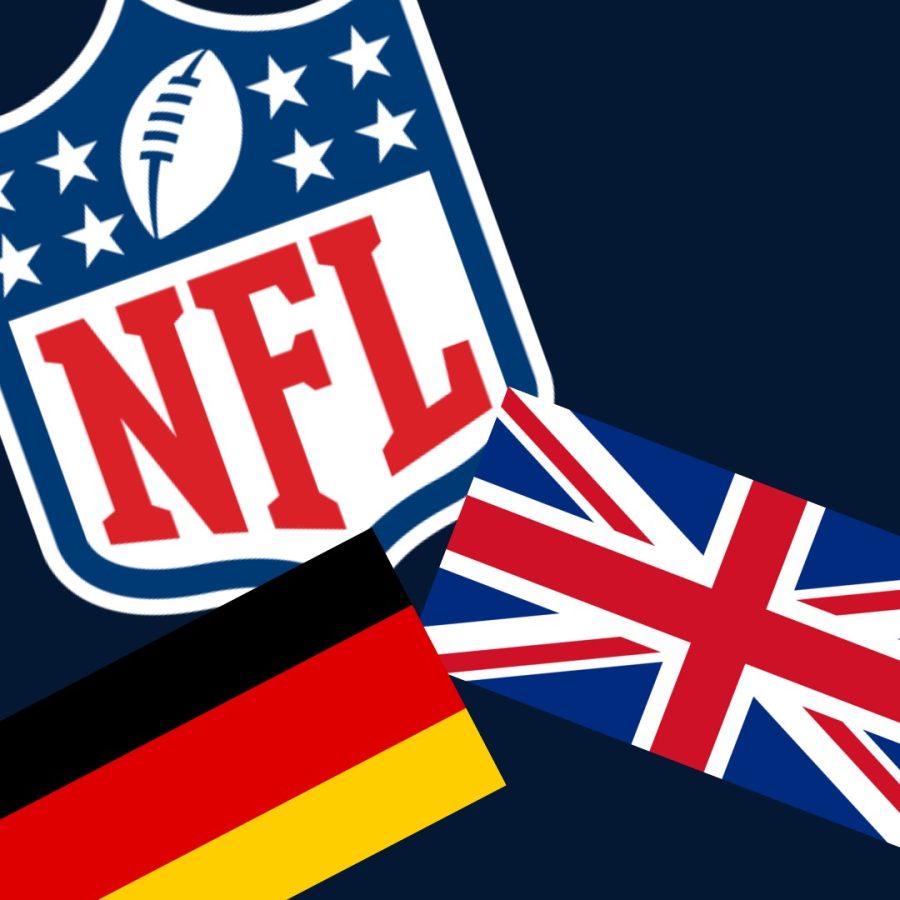NFL: It’s Time to Expand into Europe
February 9, 2023
This past October, the NFL put out the wild idea of possibly expanding and adding four new teams in Europe. Increasing the number of international fans would increase revenues for the owners, raise pay for the highest-paid NFL players, and bring the league one step closer to its $25 billion revenue target. Although the league’s potential is constrained in several ways, creating new teams in Europe is still a better plan than expanding existing teams.
The league’s connection with Europe started in 2007, at a game between the New York Giants and the Miami Dolphins at London’s Wembley Stadium, where the NFL introduced the International Series. Wembley Stadium played host to one NFL regular-season game each season from 2007 through 2012.
Only recently has the NFL’s expansion intensified, making it extremely well-liked in European nations such as Spain, the U.K., and Switzerland. Germany recently overtook Britain and has since overtaken it to take the top spot among regional markets. According to a recent study from American Football International, both nations have up to 17 million casual and up to 3.3 million ardent supporters.
Among those fans, a sizable portion actively displays interest by consuming branded goods, acquiring TV subscriptions, placing bets on their preferred teams, and so forth. Though London used to be the main center of American football fans in Europe, this recent popularity has increased the chances of fans in Europe supporting an NFL expansion.
So, where would the first team go? According to Bart Hubbuch of the New York Post, NFL Commissioner Roger Goodell stated at an NYU conference that “it’s going to be London’s team…. The New York Giants will play the London Whatevers. The details can be worked out.” The logistics the league would have to think through are concerning, and how can the NFL bring teams to Europe? Also, should the NFL go through with this at all?
At first look, it appears that moving an existing team to London and first cultivating a fan base by participating in numerous International Series games is the easiest approach to establishing a franchise there. The Jacksonville Jaguars will play at least one “home” game each year at Wembley for the following four years, as will the Buffalo Bills, Miami Dolphins, New England Patriots, and Tampa Bay Buccaneers. In order to further cultivate a fanbase there, John Oehser, a senior writer for the Jaguars’ official website, hinted that the team would perhaps play a “road” game in London during the following four years.
But moving a team to London exacerbates logistical issues. As part of a potential long-term transfer, the Bills already hold home games in Toronto. The Dolphins, even though they are dissatisfied with their existing stadium, are not likely to leave the South Florida market. The Patriots and the Buccaneers are also unlikely to move. Few clubs appear likely to depart their current states in the upcoming ten years, while the Jaguars have a lease that would take at least a $100 million payout to break.
Additionally, establishing a team’s fan base before transferring it to London may be a bad idea, creating a U.S. team with a geographically absurd name. English sports fans are used to organizations with 100-year histories and generations of supporters. The NFL could change the team’s name, but why bother gaining support first?
The issue of scheduling is another. Regardless of which franchise relocates unexpectedly, its whole division would travel the world every season. No team wants to burden its schedule with longer road trips, more expensive international travel, or shorter practice weeks. Expanding is the only viable option to bring the NFL to Europe.
Where will this first team play? The national stadium of England, Wembley Stadium, is far too busy to serve as an NFL team’s permanent home. In order to avoid playing every single game in front of a hilariously empty stadium, like the old London Monarchs did in the days of NFL Europe, they would have to draw a massive crowd.
Another issue is time zones. Fans in America would have to watch games considerably earlier than the customary periods of 1 p.m. and 4 p.m. Eastern Time associated with Sunday games because European time zones are ahead of the U.S. As it would be quite unusual for the American audience to attempt to view a game at 8 a.m. on a Sunday morning, this might have an impact on the core supporters of a team in London or Europe.
Another big problem the league would face is competing with the time zones of soccer fans. English Premier League fans in the U.S. understand the hardship of having to wake up early to watch early afternoon matches in Britain. If the New York Giants are playing the London Whatchamacallits at 1 p.m. London time, people in New York will have to watch the game at 8 a.m., and probably not with their pals in a bar or restaurant. With early games, a few late games, and prime-time games on Sunday and Monday nights, the EPL schedules its games much like the NFL does. The EPL also has a schedule of Saturday games, and English soccer teams frequently play midweek in competitions such as the FA Cup as there is no college ball to contend with.
The goal of having franchises all around the world is closer to reality with the concept of a 40-team scenario with teams dispersed across Europe, Mexico, and possibly Asia if the London Whatchamacallits are a resounding success—and in this context, they would have every opportunity to be.


